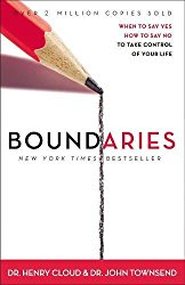
Luke 18:1-8 (NKJV)1 Then He spoke a parable to them, that men always ought to pray and not lose heart,2 saying: "There was in a certain city a judge who did not fear God nor regard man.3 Now there was a widow in that city; and she came to him, saying, 'Get justice for me from my adversary.'4 And he would not for a while; but afterward he said within himself, 'Though I do not fear God nor regard man,5 yet because this widow troubles me I will avenge her, lest by her continual coming she weary me.' "6 Then the Lord said, "Hear what the unjust judge said.7 And shall God not avenge His own elect who cry out day and night to Him, though He bears long with them?8 I tell you that He will avenge them speedily. Nevertheless, when the Son of Man comes, will He really find faith on the earth?"
The point of the parable is not that if we keep asking God for something over and over He’ll do it because we’re persistent, the purpose is that persistent prayer is the demonstration of faith in God who, may delay His answers but, will always act on behalf His people. That doesn’t mean you will get exactly what you want if you’re persistent.
If we don’t get what we ask God for, when we want it, and the way we want it, we can get frustrated and try to bargain with or make deals with God. “God if you do this I’ll do X” Lord if you get me out of this I’ll do this or I’ll never do that again”. We’ll find scriptures where it appears that God changed His mind and we’ll use that tactic when we pray, trying to get God to change His mind and then our will becomes His Will.
So here are my questions.
● Can you bargain with God?
● Can you change God’s mind?
● Will God stop me from doing my will?
(God Will Verses My Will - Will God Stop Me From Doing It My Way?)

Here’s what Drs .Dr. Henry Cloud & Dr. John Townsend say about God’s boundaries in their book Boundaries: When To Say Yes, How To Say No, To Take Control Of Your Life. If after reading this excerpt, and you want their book and entire collection including the study guide and DVD, click or touch on any of the links or pictures in the post.
Respecting God’s Boundaries
God expects His boundaries to be respected. When He makes choices, or says no to us, that is His right, His freedom. If we are to have a real relationship with Him, we need to respect that freedom.
When we try and put Him into binds where He “has to do something,” we are testing His freedom. When we are angry with Him for what He does not do, we are not allowing Him the freedom to be who He is.
The basic problem in human relationship is that of freedom. We call people bad because they do not do what we want them to do. We judge them for being themselves, for fulfilling their wishes. We withdraw love from them when they do what they feel is best for them, but it is not what we want them to do.
We do the same thing with God. We feel entitled to God’s favor, as if He has to do what we want Him to.
How do you feel when someone asks you for a favor but does not give you a free choice? This childish entitlement gets many people dissatisfied with God the same way that they are dissatisfied with others in their lives. They hate the freedom of others.
God is free from us. When He does something for us, He does it out of choice. He is not “under compulsion” or guilt or manipulation. He does things, like dying for us, because He wants to.
We can rest in His pure love; He has no hidden resentment in what He does.
His freedom allows Him to love.
Many Bible characters ran into God’s freedom and learned to embrace it. Embracing His freedom and respecting His boundaries, they always deepened their relationship with God. Job had to come to accept the freedom of God to not rescue Him when he wanted. Job expressed his anger and dissatisfaction with God, and God rewarded His honesty. But Job did not “make God bad,” in his own mind. In all of his complaining, he did not end his relationship with God. He didn’t understand God, but he allowed God to be Himself and did not withdraw his love from Him, even when he was very angry with Him. This is a real relationship.
In the same way, Paul accepted the boundaries of God. When he planned trips that didn’t work out, Paul accepted the sovereignty of God. He asked God repeatedly for a certain kind of healing that God would not give him. God said, “No. I do not choose to love you in the way that you want right now. I choose to love you with My Presence.” Paul did not reject God for setting that boundary.
Jesus was perfected through His suffering (Hebrews 5:7-10). In the Garden of Gethsemane, He asked that His cup of suffering pass from Him, but God said no. Jesus accepted God’s wishes, submitted to them, and through that “became the source of eternal salvation for all who obey Him” (Hebrews 5:9). If Jesus had not respected God’s boundaries and God’s no, we would all be lost.
In the same way that we want others to respect our no, God wants us to respect His.
He does not want us to make Him the bad guy when He makes a choice. We do not like others trying to manipulate or control us with guilt, and neither does He.
“I Respectfully Disagree”
Then again, God does not want us to be passive in our relationship with Him either.
When we make our feelings and wishes known, God responds. It wouldn’t be a real relationship if we couldn’t.
God wants us to respect His boundaries; He doesn’t want us to withdraw our love when He says no. But He has nothing at all against our trying to persuade Him to change His mind. In fact, He asks for us to be tenacious. Often he says, “Wait,” seeing how much we really want something. Other times, it seems He changes his mind as a result of our relationship with Him. Either way, we respect His wishes and stay in relationship.
Excerpted with permission from Boundaries: When To Say Yes, How To Say No, To Take Control Of Your Life by Dr. Henry Cloud and Dr. John Townsend, copyright Zondervan.

Boundaries: When To Say Yes, How To Say No, To Take Control Of Your Life
Unpacking ten “laws of boundaries,” Drs. Cloud and Townsend show you how to bring new health to your relationships. You’ll discover firsthand how sound boundaries give you the freedom to walk as the loving, giving, fulfilled individual God created you to be.
Having clear boundaries is essential to a healthy, balanced lifestyle. A boundary is a personal property line that marks those things for which we are responsible. In other words, boundaries define who we are and who we are not. Boundaries impact all areas of our lives:
Physical boundaries help us determine who may touch us and under what circumstances.
Mental boundaries give us the freedom to have our own thoughts and opinions.
Emotional boundaries help us to deal with our own emotions and disengage from the harmful, manipulative emotions of others.
Spiritual boundaries help us to distinguish God's will from our own and give us renewed awe for our Creator.
Often, Christians focus so much on being loving and unselfish that they forget their own limits and limitations. When confronted with their lack of boundaries, they ask:
- Can I set limits and still be a loving person?
- What are legitimate boundaries?
- What if someone is upset or hurt by my boundaries?
- How do I answer someone who wants my time, love, energy, or money?
- Aren't boundaries selfish?
- Why do I feel guilty or afraid when I consider setting boundaries?
Dr. Henry Cloud and Dr. John Townsend offer biblically-based answers to these and other tough questions, showing us how to set healthy boundaries with our parents, spouses, children, friends, co-workers, and even ourselves.


 RSS Feed
RSS Feed